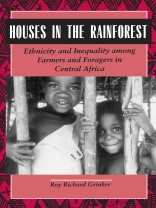This is the first ethnographic study of the farmers and foragers of northeastern Zaire since Colin Turnbull’s classic works of the 1960s. Roy Richard Grinker lived for nearly two years among the Lese farmers and their long-term partners, the Efe (Pygmies), learned their languages, and gained unique insights into their complex social relations and ethnic identities. By showing how political organization is structured by ethnic and gender relations in the Lese house, Grinker challenges previous views of the Lese and Efe and other farmer-forager societies, as well as the conventional anthropological boundary between domestic and political contexts.
This is the first ethnographic study of the farmers and foragers of northeastern Zaire since Colin Turnbull’s classic works of the 1960s. Roy Richard Grinker lived for nearly two years among the Lese farmers and their long-term partners, the Efe (Pygmies)
Mục lục
Preface
Acknowledgments
Note on Language and Orthography
1. Introduction: From Tribes to Ethnic Groups
2. The History and Isolation of the Lese
3. Gender and Ethnicity
4. The House and the Economy
5. Witchcraft and the Opposition of Houses
6. Conclusion: A Union of Opposites
References
Index
Giới thiệu về tác giả
Roy Richard Grinker is Assistant Professor of Anthropology and International Affairs at George Washington University.












